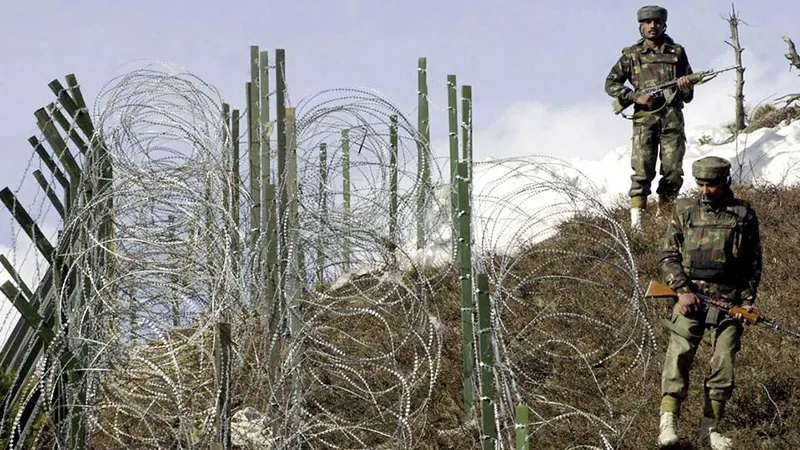Recent developments along the India-Pakistan border have grabbed the attention of the world have caused fear and uncertainty in both countries. The 18 September attack on an Indian army base in Kashmir and subsequent unravelling of diplomatic and military tension, between the two nation has caused a steady build up of tension in the corridors of power in New Delhi, Islamabad and Rawalpindi.
With Pakistan denying the surgical strikes and India refusing to prove them wrong and providing proof, the conflict has been kept controlled. If there is any hope to keep the conflict controlled, and prevent it from full-scale war, Nawaz Sharif must be able to a fine line between coaxing India and satisfying his military. Pakistan must realise the futility and irrationality of protecting militants and terrorist groups, and for its betterment seek to dismantle its traditional, use of militants to conducting its foreign policy.
In the aftermath of the attack on the Indian army base by Pakistan-backed militants, India has adopted a multi-pronged retaliatory response by unleashing diplomatic hell on Pakistan at United Nations and by conducting surgical strikes on terrorist camps along the border. At the UN, asking it to abandon its dreams on Kashmir and ‘introspect on Balochistan’ instead. External Affairs Minister, Sushma Swaraj, lead the tirade against Pakistan stating that the world knew where terrorism and it was time for the world to isolate those nations which nurture, peddle and export terrorism. Not surprisingly, Pakistan responded to Swaraj’s ‘litany of lies’ and accused India of diverting attention from its ‘atrocities in Kashmir’.
By reaching out to fellow SAARC nation countries, New Delhi has successfully ensured the postponement of the summit in Islamabad by withdrawing from the summit and having Afghanistan, Bhutan, Bangladesh and Sri Lanka follow suit. All countries have stated their inability to attend the summit given the security environment that is not conducive to regional cooperation. On a bilateral front, India has had discussions over withdrawing Pakistan’s Most Favoured Nation Status (MFN) status and changing its stance on the Indus Water Treaty. While it has chosen not to act on those aspects of the relationship as of now, it has sent Pakistan a strong message: it will not hesitate in enforcing all forms of pressure in the future.
Ten days after the attack, India launched pre-emptive surgical strikes against terror camps along the LoC that had “positioned themselves at launch pads” ready to infiltrate and carry out attacks in Kashmir. By stating the pre-emptive nature of the strike and the fact that it does not plan to conduct any more such strikes, India ensured that the strike was not seen as an offensive attack on Pakistan territory, a move which may have escalated the conflict rapidly. Pakistan has denied the strike and has flown in foreign and domestic journalists to the LoC to prove their point. What does this mean? With India saying it conducted strikes and Pakistan saying it didn’t, where does it leave the two countries and what are the repercussions?
First, it allows the Pakistan narrative to flourish domestically. It has caused Pakistanis to further doubt India’s integrity and has raised questions as to why the Indian government has not provided greater details of the nature of the strikes and/or evidence that they happened. This suits Islamabad and Rawalpindi as they are no longer forced to respond to something ‘India made up’. Second, it allows the conflict to remain as is, and avoid further escalation of military confrontation. The truth about the strikes is known only to a select few in each country and by not providing proof of the strikes, both countries have jointly kept the conflict in control for the time being.
As the calls for providing evidence of the strikes in India gets louder, the government may be pushed into a tighter corner and forced to provide irrefutable evidence. While any evidence India provides will be refuted by Islamabad, it may provoke the sleeping dragon in Rawalpindi. The army may be forced to react to save face, if it is proved that the Indian army entered Pakistan territory. Any sort of military retaliation from Pakistan will force the right-wing nationalistic, ‘tough-on-Pakistan’ Narendra Modi government into a retaliatory war.
However, in an unprecedented move, the Nawaz Sharif government has warned the military about Pakistan’s increasing isolation. In a report by DAWN, the civilian government has sought agreement with the military on certain matters of the state, including non-interference of the military in law-enforcement cases against militant groups. Nawaz Sharif has also directed for fresh attempts to be made to wrap up the Pathankot and the Mumbai 26/11 cases and has also made a case for cracking down on the Haqqani Network, highlighting the increasing United States pressure that has already caused a deterioration in relations.
This is a silver lining on what has been a grey, foreboding cloud. While it remains unlikely that the military will buckle down it is vital for Pakistan’s civilian government to make an attempt to loosen the military’s grip on certain conditions laid down by India and the US. Cracking on terror groups such as Jaish-e-Mohammad, Lashkar-e-Taiba and the Haqqani Network will not only demonstrate the power of the civilian government, but it will earn Raheel Sharif and his men, new found respect amongst the people of Pakistan. The military’s counterinsurgency operation Zarb-e-Azb, which has been in effect since 2013 has been in full swing cracking down on terror camps in the tribal areas bordering Afghanistan. While the military’s communicating wing, has played a highly successful campaign in highlight the Pakistan military’s determination and resolve to root out militants and terrorists that threaten the country, the absence of any action against the Haqqani Network and JeM is jarring and obvious. Although Pakistan cannot overtly demonstrate that it is listening to what India is saying, showing India and the world, some goodwill will help Pakistan redeem itself in the world’s eyes. Not to mention, it will do Pakistan a whole of good domestically.
Both India and Pakistan would do well to remember that their problems will be far better resolved, if they are able to work in tandem, seeking solely diplomatic solutions. India must remind itself of its ultimate goal vis-à-vis Pakistan. New Delhi’s aim is not the military destruction of Pakistan, but to exert enough pressure that it abandons its use of terrorism as an instrument of foreign policy. It must humbly recognize that surgical strikes are not strategic game changers in the conflict, but psychological maneuvers that are directed to coerce Pakistan to give up its policy of supporting militants. If history has taught us anything it is that, Pakistan is so quintessentially bipolar in his governance that it is highly optimistic to assume that the military will let civilian government dictate terms to it. It is therefore unlikely that given the present situation, Pakistan will bow down and ‘give in’. Pakistan military intelligence agencies have been providing militant groups with support for many, many years. Their alliances with militant leaders such as Sirajuddin Haqqani, Masood Azhar and Hafiz Saeed have been sacrosanct. If the military allows civilian law enforcement agencies to act against such militant groups, the backlash will brutal and dangerous on their part.
That being said, in the spirit of discussing an optimal and ideal situation to get out of the current mess, if the civilian government in Pakistan is able to put enough pressure on the military to give into certain demands, Nawaz Sharif will be relieved having saved the country from conflict and diplomatic humiliation, however the credit will go to Raheel Sharif. The army chief will end his tenure on a high, his popularity soaring having been true to his word of rooting out militancy in Pakistan and saving the country from international isolation. In India while the army will continue to be praised for its heroism, all our aware of the political bidding behind the strikes. The Narendra Modi government will be able to pat itself on the back for successfully exercised strategic restraint against Pakistan and having shed any sort of domestic doubt that they are a government that are “too soft” on Pakistan.
Pakistan must realize that it cannot draw out and postpone the inevitable. It must seriously take down all terror and militant infrastructure in the country and disregard terrorism as an instrument of foreign policy. For far too long, the military has propagated the belief that it is doing everything it can to take down terror infrastructure in the country. While the United States has pressurized it to do more, by blocking subsidized sale of military equipment and repeatedly reminding it of its promises, Pakistan must give up its game for its own good. Irrespective of what it wants from India vis-à-vis Kashmir, it must realize that only by sincerely committing to absolving terror from its territory can it find its redemption.
Then and only then, can both India and Pakistan begin to rehash their problems.
This commentary originally appeared in Modern Diplomacy
The views expressed above belong to the author(s). ORF research and analyses now available on Telegram! Click here to access our curated content — blogs, longforms and interviews.




 PREV
PREV


